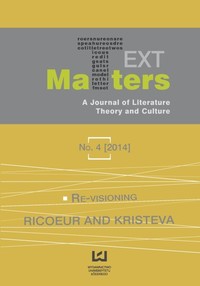Abjection and Sexually Specific Violence in Doris Lessing’s The Cleft
DOI:
https://doi.org/10.2478/texmat-2014-0011Abstract
The article applies selected concepts from the writings of Julia Kristeva to the analysis of a novel by Doris Lessing entitled The Cleft. Published in 2007, The Cleft depicts the origin of sexual difference in the human species. Its emergence is fraught with anxiety and sexually specific violence, and invites comparison with the primal separation from the mother and the emancipation of the subject in process at the cost of relegating the maternal to the abject in the writings of Julia Kristeva. Lessing creates an ahistorical community of females (Clefts) from which the male community (Squirts) eventually evolves. The growing awareness of sexual difference dovetails with the emotional and intellectual development, as the nascent human subject gradually enters linear time viewed from perspective by the narrator of the novel, a Roman senator who hoards ancient manuscripts with the story of Clefts and Squirts. The article juxtaposes the ideas of Lessing and Kristeva, who have both cut themselves off from feminism, and have both been inspired by psychoanalysis. Primarily, Lessing’s fictional imaginary can be adequately interpreted in light of Kristeva’s concept of abjection as an element that disturbs the system. My interpretation of abjection is indebted to Pamela Sue Anderson’s reading of Kristeva, notably her contention that violence as a response to sexual difference lies at the heart of collective identity. Finally, the imaginary used by Lessing and Kristeva is shown to have stemmed from the colonial imaginary like the concepts of Freud and Jung.
Downloads
References
Adams, Alice Elaine. Reproducing the Womb: Images of Childbirth in Science, Feminist Theory and Literature. Ithaca: Cornell UP, 1994. Print.
Google Scholar
Anderson, Pamela Sue. A Feminist Philosophy of Religion: The Rationality of Myths and Religious Beliefs. Oxford: Blackwell, 1998. Print.
Google Scholar
Anderson, Pamela Sue. “Sacrificed Lives: Mimetic Desire, Sexual Difference and Murder.” Cultural Values 4 (2000): 216-27. Print.
Google Scholar
Butler, Judith. Gender Trouble. Feminism and the Subversion of Identity. New York: Routledge, 1999. Print.
Google Scholar
Jung, Carl Gustav. Archetypes of the Collective Unconscious. Collected Works of C.G. Jung. Vol. 9. Trans. R. F. C. Hull. London: Routledge, 1991. Print.
Google Scholar
Kowalska, Krystyna, Jan Rembiszewski, and Halina Rolik, eds. Mały słownik zoologiczny. Ryby. Warszawa: Wiedza Powszechna, 1973. Print.
Google Scholar
Kristeva, Julia. Powers of Horror: An Essay on Abjection. Trans. Leon S. Roudiez. New York: Columbia UP, 1982. Print.
Google Scholar
Lessing, Doris. The Cleft. New York: Harper, 2008. Print.
Google Scholar
Lessing, Doris. The Golden Notebook. New York: Harper, 1999. Print.
Google Scholar
Lessing, Doris. Walking in the Shade. Volume Two of My Autobiography 1949-1962. New York: Harper, 1999. Print.
Google Scholar
Ramsay, L. Raylene. The French New Autobiographies: Sarraute, Duras, and Robbe Grillet. Gainesville: U of Florida P, 1996. Print.
Google Scholar
Sjoholm, Cecilia. Kristeva and the Political. London: Routledge, 2013. Print.
Google Scholar
Sobrinho, Blasco José. Signs, Solidarities, and Sociology: Charles S. Peirce and the Pragmatics of Globalization. New York: Rowman, 2001. Print
Google Scholar
Downloads
Published
How to Cite
Issue
Section
License

This work is licensed under a Creative Commons Attribution-NonCommercial-NoDerivatives 4.0 International License.













